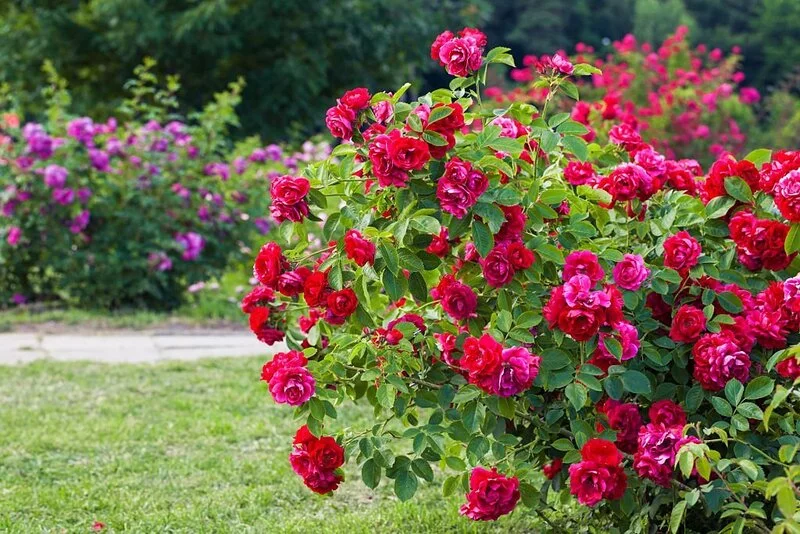Ah, the rose bush – a symbol of love, beauty, and elegance. Roses have captured our hearts and imaginations for centuries, gracing our gardens with their vibrant colors and intoxicating fragrances. But have you ever stopped and wondered, “How long does a rose bush live?” It’s a question that has puzzled many a green thumb. So, let’s dive into the enchanting world of roses and discover the secrets of their longevity.
- Large, double red blooms
- USDA zones 5-11
- Plant will ship dormant if ordered mid-fall to mid-spring
- Deciduous – loses its leaves during the winter months
- Water twice per week until established, then water once per week
Factors That Influence a Rose Bush’s Lifespan
Just like us, rose bushes have their own life stories, with lifespans that can vary quite a bit. And just like our life expectancy is influenced by our lifestyle, diet, and environment, a rose bush’s lifespan is shaped by a mix of factors.
First, the type of rose plays a significant role. Some varieties are like the tortoises of the rose world, slow and steady, living for many decades. Others, like hybrid teas, might have shorter lifespans.
Second, the care we give our roses makes a huge difference. Proper watering, feeding, and pruning can help a rose bush live a longer, healthier life.
Third, our climate impacts our roses. Roses love sun and well-drained soil, and they’re not fans of extreme cold or heat.
Lastly, disease resistance is crucial. Some roses are more susceptible to pests and diseases, which can shorten their lifespan.
As you can see, a rose bush’s lifespan isn’t just a matter of time. It’s a story of variety, care, environment, and resilience. Now, let’s explore the lifespans of different types of rose bushes.
Lifespan of Different Types of Rose Bushes
Now, onto the main event – how long do different types of rose bushes live?
Well, hybrid tea roses, the prima donnas of the rose world, usually live for about 10 to 15 years with good care. They’re beautiful and delicate, requiring a little extra attention.
Floribundas and grandifloras, known for their vibrant displays, typically have a lifespan similar to hybrid teas, ranging from 10 to 15 years.
Climbing roses, the acrobats of the bunch, can live for around 15 to 25 years, giving you many seasons of breathtaking height and color.
And then there are the old garden roses, the wise elders of the rose community. They can live for an impressive 50 years or more! These roses truly stand the test of time.
How to Extend the Lifespan of Your Rose Bushes
Love your roses and want to keep them around for as long as possible? Here are some tips to help your roses live their best life:
- Water wisely: Roses love water, but not too much or too little. Make sure your roses get about an inch of water a week, but avoid wetting the leaves as this can lead to disease.
- Feed them well: Roses are heavy feeders. Use a rose-specific fertilizer to give them the nutrients they need.
- Prune with purpose: Pruning helps your roses stay healthy and productive. Remove dead or weak growth each spring, and your rose will thank you with a flush of blooms.
- Disease prevention: Keep an eye out for signs of disease or pests. The sooner you catch and treat these problems, the better.
Remember, a little love goes a long way with roses. Treat them right, and they’ll reward you with many seasons of beauty.
- Miracle-Gro Water Soluble Rose Plant Food grows bigger, more beautiful roses versus unfed plants
- This rose food starts to feed instantly
- Feed with our rose fertilizer every 7 to 14 days
- Use with Miracle-Gro Garden Feeder or any watering can
- Guaranteed not to burn when used as directed
Recognizing the End of a Rose Bush’s Lifespan
Like all living things, rose bushes eventually reach the end of their lifespan. But how can you tell when this is happening?
First, you might notice a decrease in vigor. Maybe your rose isn’t producing as many blooms as it used to, or its leaves look a little less lush. This could be a sign of old age.
Second, if your rose is getting sick often, despite your best care, it might be nearing the end of its life. Frequent disease or pest issues can be a sign that your rose’s natural defenses are weakening.
Finally, if your rose fails to leaf out in spring, or its canes start dying back, it might be time to say goodbye. It’s always hard to lose a plant, but remember, every end is a new beginning, a chance to try something new in your garden.
Conclusion
The world of roses is full of beauty, fragrance, and variety. Whether your rose lives for a decade or for half a century depends on its type and the care it receives. No matter their lifespan, roses bring joy to our lives every single day they bloom. So, treasure your time with your roses, care for them well, and they’ll continue to brighten your garden year after year. And when they do reach the end of their lives, remember all the beauty they brought into your world. Because that, dear reader, is the true magic of roses.





